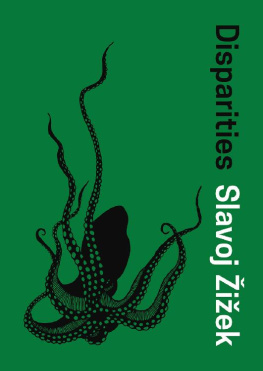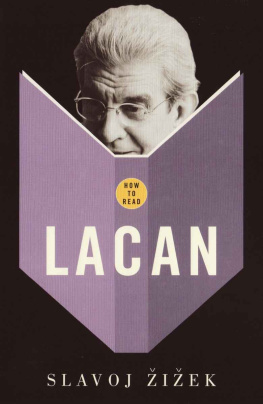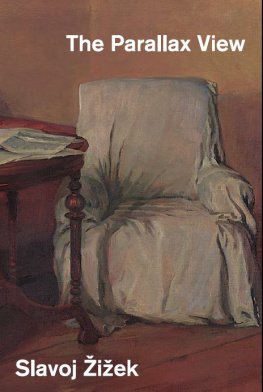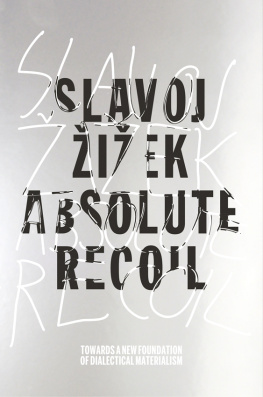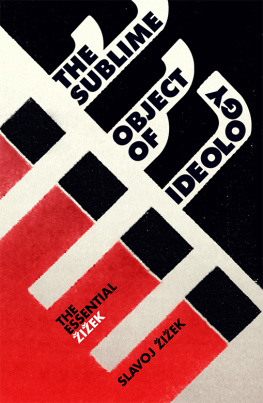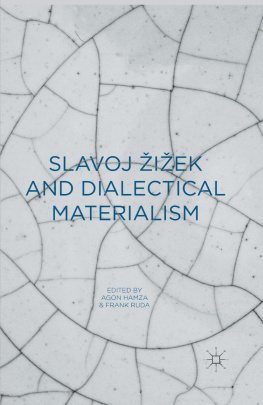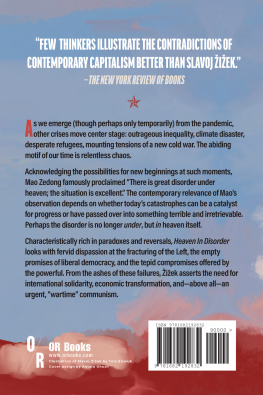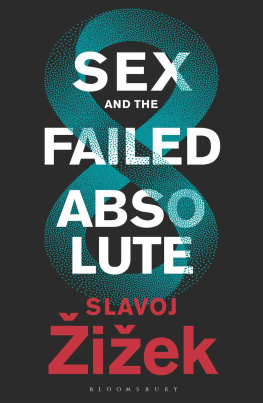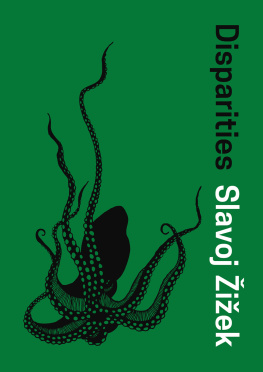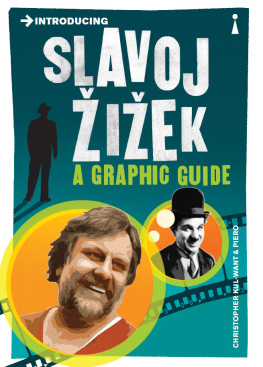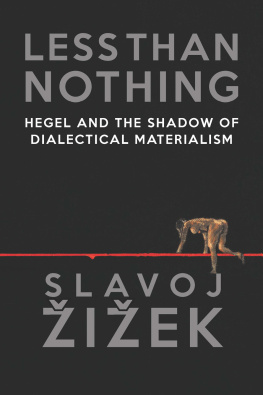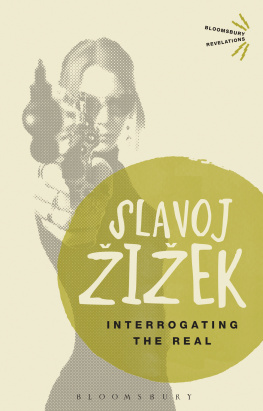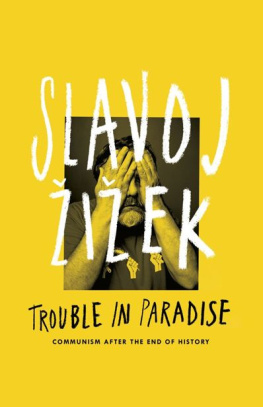DISPARITIES
ALSO AVAILABLE FROM THE SAME AUTHOR
Antigone , Slavoj iek
Interrogating the Real , Slavoj iek
ALSO AVAILABLE FROM BLOOMSBURY
On Resistance , Howard Caygill
Rome , Michel Serres
The Lost Thread , Jacques Rancire
For Kostja and Tim, with all our disparities!
DISPARITIES
Slavoj iek
Bloomsbury Academic
An imprint of Bloomsbury Publishing Plc
CONTENTS
I believe there has been no dangerous vacillation or crisis of German culture this century that has not been rendered more dangerous by the enormous and still continuing influence of this philosophy, the Hegelian.
The premise of the present book is a simple one: yes, Nietzsche is right (in this statement from The Use and Abuse of History The story begins with Shakespeares Hamlet, who congratulates the ghost of his father for continuing to speak from under the stage: Well said, old mole! ( Hamlet , act 1, scene 5). Hegel refers to this scene in the Conclusion of his Lectures on the History of Philosophy in order to characterize the subterranean work not of a ghost, but of the World Spirit in laying ground for a new epoch:
Spirit often seems to have forgotten and lost itself, but inwardly opposed to itself, it is inwardly working ever forward (as when Hamlet says of the ghost of his father, Well said, old mole! canst work i the ground so fast?) until grown strong in itself it bursts asunder the crust of earth which divided it from the sun, its Notion, so that the earth crumbles away.
The reasons are obvious: the Mole comes all too close to implying some substantial Reason which, through its cunning, secretly pulls the strings of history. Sometimes, Hegel makes this point in an even more direct and vulgar way, as in his letter to Niethammer from 1816:
I adhere to the view that the world spirit has given the age marching orders. These orders are being obeyed. The world spirit, this essential, proceeds irresistibly like a closely drawn armored phalanx advancing with imperceptible movement, much as the sun through thick and thin. Innumerable light troops flank it on all sides, throwing themselves into the balance for or against its progress, though most of them are entirely ignorant of what is at stake and merely take head blows as from an invisible hand.
It is difficult to imagine a notion more obviously out of sync with contemporary sensibility. What seems to offer itself as a no less obvious replacement for mole is, of course, rhizome, a complex network of interconnections without a central controlling agency. However, in my Stalinist mind, the fact that Deleuze borrowed this term from Jung
The element in which a Kraken thrives is water, and it is by no means an accident that Thales of Miletus, usually counted as the first philosopher, a representative of so-called Ionian materialists, posited as the substance of everything, as the first principle out of which everything emerges, water.the structure of the whole space changes, a foreign element wins over the stability of home, a fluid process wins over the stability of a firm substance. What this means, in more abstract terms, is that, although both earth and water may appear to be elements of a preconceptual mythic space, water as the primordial principle already functions as a concept , in contrast to earth as a mytho-poetic entity. Or, as Hegel put it, water as the primordial principle is no longer the material water but an ideal entity. The shift from mole to Kraken is primarily the change in the element in which entity dwells from earth to water.
The mythic Kraken, this ultimate figure of an abject, a gigantic creature sleeping for an eternity at the bottom of the ocean and set to awaken from his slumber in an apocalyptic age, was celebrated by Alfred Tennyson in his poem from 1830: There hath he lain for ages, and will lie / Battening upon huge sea worms in his sleep, / Until the latter fire shall heat the deep; / Then once by man and angels to be seen, / In roaring he shall rise and on the surface die. Are our times more precisely, the times of capitalist modernity not such an epoch of the awakened Kraken? Is Kraken not a perfect image of the global Capital, all-powerful and stupid, cunning and blind, whose tentacles regulate our lives?
Insofar as Hegels dialectics is, at its most basic, a theory of modernity, a theory of the break between tradition and modernity, the properly dialectic moment of a historical process is precisely the moment when the Kraken awakens and disrupts the smooth surface, the moment when Krakens disruptive power of negativity is felt in all its destructive impact. What are explosions of unexpected economic crises, of irrational social violence, if not the echoes of the whips of Krakens tentacles? Even today, there is no thinker more capable of discerning these echoes than Hegel.
Nietzsches dismissal of Hegel is just the extreme case of a stance which was most clearly expressed by the title of Benedetto Croces book on Hegel: What Is Alive and What Is Dead in Hegel? If Hegel is not proclaimed dead outright, he is treated as a kind of living dead who continues to haunt us only because he forgot that he is already dead. Perhaps, however, the time has come to do what Adorno suggested half a century ago, namely, to turn this question around and to ask: what if, from an authentic Hegelian standpoint, it is we who are dead, not Hegel? In one of the Marx brothers movies, Groucho tests the pulse of a patient, holding his fingers on the patients wrist and comparing the rhythm with the flow of the seconds as indicated on his hand watch, and exclaims: Either my watch stopped working or you are dead! The present book endeavours to provide a kind of Hegelian diagnostic of our present moment; in order to achieve this, it takes as its starting point the concept of disparity , and it deploys figures of disparity in the sense of figurae veneris in erotics: different positions or figurations of disparity.
Disparity is a concept that designates what, in a more descriptive language, we may call the disruptive effects of the awakened Kraken. The present book follows these disruptive effects of Krakens tentacles in three main domains: ontological, aesthetic, and theologico-political. At the ontological level, disparity is at its most radical ontological difference, so the first part of the book deals with the persistence of ontological difference in our capitalist-technological world which is getting more and more one-dimensional. At the aesthetic level, the disparate element is the repelling X targeted by a series of partially overlapping notions: ugly, disgusting, abject, and so on. The theological name for disparity is, of course, god as the radical otherness with regard to the order of being, while in politics it is the millenarian prospect of a radical new beginning based upon the erasure of the past, and it is easy to imagine the explosive potential of combining the two.
The triadic structure of the book thus repeats the classic triad of Truth, Beauty and the Good, focusing on the disruptive power of the Kraken in each of the three. deploying the passage from traumatized subject to subject itself as trauma (Schuster, Malabou). A short conclusion draws some political implications of the notion of disparity.
In each of these three domains, a brutal battle is going on, a struggle against the different forms of obfuscating disparity. This struggle is philosophy or, as Louis Althusser put it decades ago, condensing the teachings of the classics into a single concise formula: philosophy is, in the last instance, class struggle in the field of theory: Marxist-Leninist philosophy, or dialectical materialism, represents the proletarian class struggle in theory . This paradox holds perfectly for the philosophical warfare in which one does not simply fight to defend a predefined position: one rather fights in order to discern which this position is.
Next page
